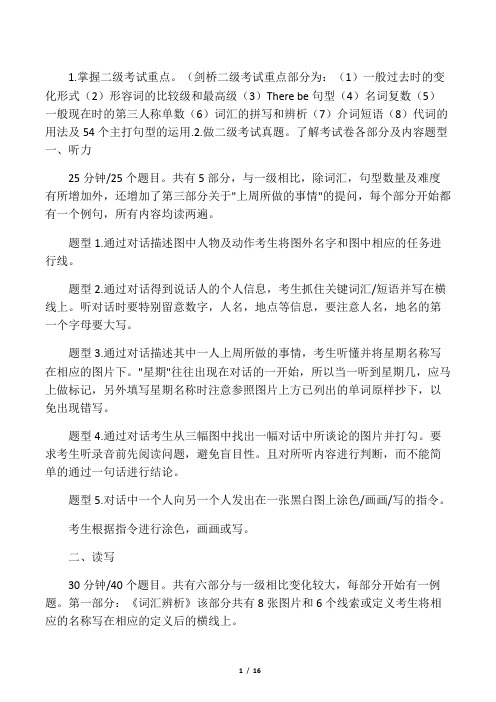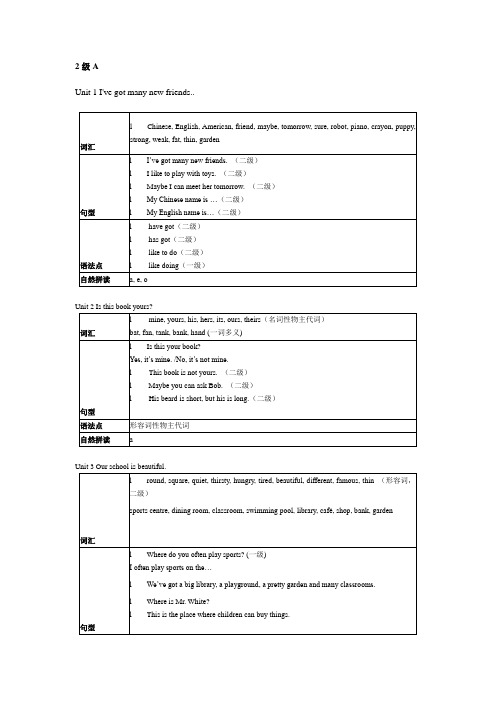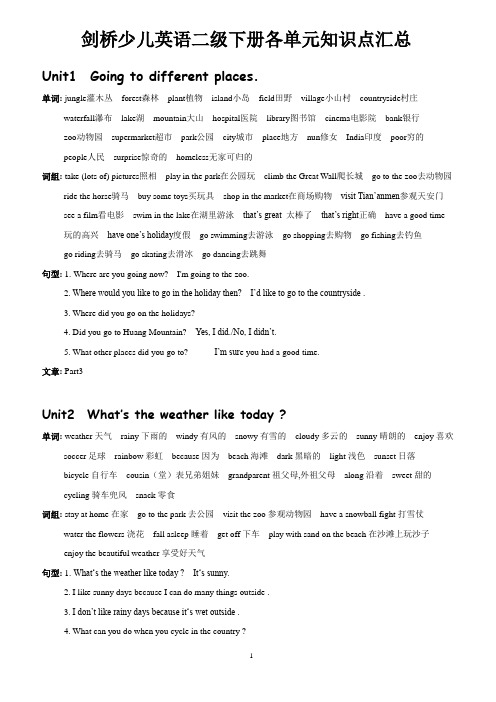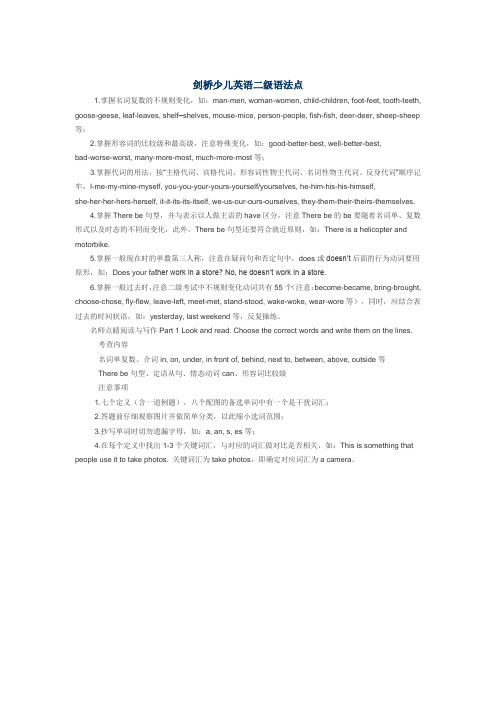2018-2019-剑桥少儿英语二级考试必考语法-word范文 (1页)
剑桥少儿英语二级考试复习资料全

1.掌握二级考试重点。
(剑桥二级考试重点部分为:(1)一般过去时的变化形式(2)形容词的比较级和最高级(3)There be句型(4)名词复数(5)一般现在时的第三人称单数(6)词汇的拼写和辨析(7)介词短语(8)代词的用法及54个主打句型的运用.2.做二级考试真题。
了解考试卷各部分及内容题型一、听力25分钟/25个题目。
共有5部分,与一级相比,除词汇,句型数量及难度有所增加外,还增加了第三部分关于"上周所做的事情"的提问,每个部分开始都有一个例句,所有内容均读两遍。
题型1.通过对话描述图中人物及动作考生将图外名字和图中相应的任务进行线。
题型2.通过对话得到说话人的个人信息,考生抓住关键词汇/短语并写在横线上。
听对话时要特别留意数字,人名,地点等信息,要注意人名,地名的第一个字母要大写。
题型3.通过对话描述其中一人上周所做的事情,考生听懂并将星期名称写在相应的图片下。
"星期"往往出现在对话的一开始,所以当一听到星期几,应马上做标记,另外填写星期名称时注意参照图片上方已列出的单词原样抄下,以免出现错写。
题型4.通过对话考生从三幅图中找出一幅对话中所谈论的图片并打勾。
要求考生听录音前先阅读问题,避免盲目性。
且对所听内容进行判断,而不能简单的通过一句话进行结论。
题型5.对话中一个人向另一个人发出在一张黑白图上涂色/画画/写的指令。
考生根据指令进行涂色,画画或写。
二、读写30分钟/40个题目。
共有六部分与一级相比变化较大,每部分开始有一例题。
第一部分:《词汇辨析》该部分共有8张图片和6个线索或定义考生将相应的名称写在相应的定义后的横线上。
第二部分《判断对错》有一张图片和对其进行描述的6个句子在相应的句子后写yes 或no。
第三部分:《书面对话》又6个句子,每个问句有三种回答,其中只有一个问句是正确的,根据问句内容选出正确答案。
此部分是考生丢分较普遍和集中的地方,希望考生加强日常用语的练习。
剑桥少儿英语二级重点

2级AUnit 1 I've got many new friends..Unit 2 Is this book yours?Unit 3 Our school is beautiful.Unit 4 Miss, can I ask you a question?Unit 5 How about coming with us?Unit 6 He likes reading picture books.Unit 7 You mustn't drop litter in the park!Unit 8 Who is the winner?2级AUnit 9 Sally is taller than Ben.Unit 10 Did you know?Unit 11 I went to the zoo yesterday.Unit 12 Has your school got a swimming pool?Unit 13 My seven daysUnit 14 How often does he have sports?Unit 15 I enjoy reading picture stories!Unit 16 Winter fun2级BUnit 1 Going to different placesUnit 2 What's the weather like today?Unit 3 Let's play doctors.Unit 4 I can see with my eyes.Unit 5 Simon Paul lives in the country.Unit 6 I'd like a glass of water.Unit 7 I've got to go and see!Unit 8 Who is the first?2级BUnit 9 I like sunny days but I don't like rainy days.Unit 10 Let's guess.Unit 11 What's your hobby?Unit 12 Animals are our good friends.Unit 13 I can spot the frog, can you?Unit 14 There isn't any bread in the kitchen!Unit 15 Let's find it quickly!Unit 16 He can do better than his brother!。
(完整版)剑桥少儿英语二级下册各单元知识点汇总

剑桥少儿英语二级下册各单元知识点汇总Unit1 Going to different places.单词: jungle灌木丛forest森林plant植物island小岛field田野village小山村countryside村庄waterfall瀑布lake湖mountain大山hospital医院library图书馆cinema电影院bank银行zoo动物园supermarket超市park公园city城市place地方nun修女India印度poor穷的people人民surprise惊奇的homeless无家可归的词组: take (lots of) pictures照相play in the park在公园玩climb the Great Wall爬长城go to the zoo去动物园ride the horse骑马buy some toys买玩具shop in the market在商场购物visit Tian’anmen参观天安门see a film看电影swim in the lake在湖里游泳that’s great 太棒了that’s right正确have a good time 玩的高兴have one’s holiday度假go swimming去游泳go shopping去购物go fishing去钓鱼go riding去骑马go skating去滑冰go dancing去跳舞句型: 1.Where are you going now? I'm going to the zoo.2. Where would you like to go in the holiday then? I’d like to go to the countryside .3. Where did you go on the holidays?4. Did you go to Huang Mountain? Yes, I did./No, I didn’t.5. What other places did you go to? I’m sur e you had a good time.文章: Part3Unit2What’s the weather like today ?单词: weather天气rainy下雨的windy有风的snowy有雪的cloudy多云的sunny晴朗的enjoy喜欢soccer足球rainbow彩虹because因为beach海滩dark黑暗的light浅色sunset日落bicycle自行车cousin(堂)表兄弟姐妹grandparent祖父母,外祖父母along沿着sweet甜的cycling骑车兜风snack零食词组: stay at home在家go to the park去公园visit the zoo参观动物园have a snowball fight打雪仗water the flowers浇花fall asleep睡着get off下车play with sand on the beach在沙滩上玩沙子enjoy the beautiful weather享受好天气句型: 1.What‘s the weather like today ? It‘s sunny.2. I like sunny days because I can do many things outside .3. I don’t like rainy days because it‘s wet outside .4. What can you do when you cycle in the country ?文章: Part1歌谣: Part9 I like windy daysUnit3 Let’s play doctors.单词: earache耳朵疼toothache牙疼stomachache胃疼headache头疼temperature温度cough咳嗽matter问题medicine药doctor医生zookeeper动物园管理员dentist牙医knee膝盖sick生病的although尽管centimetre厘米nurse护士granddaughter孙女wide宽的kiss吻hug拥抱词组: have an earache 患耳病let me see让我看一看find out找出it doesn’t matter没关系have a look 看一看eat sweet food吃甜食come on加油go out出去stay in bed呆在床上drink a lot of water 多喝水pick up捡起fall out of a tree摔下树来run a temperature发烧give sb. a big hug and a kiss 给某人一个热烈拥抱和亲吻句型: 1.What’s the matter with this doll ? She’s got an earache .2. She’ll be OK in two days .3. What’s the matter with you? I’m running a temperature.文章: Part1歌谣: Part7 nurse , come quick!Unit4 I can see with my eyes.单词: clean打扫brush刷use使用special特殊的smell闻taste品尝touch触摸hear听leaves树叶crab螃蟹grow生长flat平坦的ground地面upwards向上similar相似的词组: clean the elephant with a brush用刷子刷大象smell the flowers with the nose用鼻子闻花香get things 得到物品I can hear 我能听见I can smell 我能闻到I can taste 我能品尝I can touch我能摸到I can see我能看到句型: 1.I can clean the elephant with a brush. 2. This animal uses its legs to catch food.3. I can smell the flowers with my nose.4. What body parts does a plant have?Unit5 Simon Paul lives in the country.单词:live居住country国家ready准备nowhere哪里都不somewhere某处remember记忆field田地either也never从不worry担心wait等待picnic野餐breathe 呼吸词组: don’t worry不要担心come inside进来get in进入in the evening在晚上listen to birds singing听鸟儿唱歌sleep on the grass睡在草地上play sports games做体育运动visit friends看朋友meet lots of people见很多人go to the supermarket去超市have a picnic野餐see farm animals看农场动物breathe clean air呼吸新鲜空气live in the country住在农村learn sth. by heart用心记住句型: 1.Would you like to visit your cousin Bob in the city this weekend?2. I don’t like gonging to the city. There are too many cats .3. Where do you like living? I like living in the city .4. What can you do in the city / countryside? I can …文章:Part1歌谣:Part9 Simon PaulUnit6 I’d like a glass of water.单词: bowl碗moment一会儿question问题dialogue对话nothing什么都没有soup汤词组: a cup of tea一杯茶 a cup of coffee一杯咖啡 a cup of water一杯水a bowl of soup 一碗汤a bottle of juice一瓶果汁 a bottle of lemonade一瓶柠檬汁 a bag of popcorn一袋爆米花a box of toys一盒玩具not at all一点也不here you are给你go to sleep睡觉get up起床turn on the light打开灯that would be nice太好了thanks a lot非常感谢句型: 1.What would you like, sir? I’d like a glass of water.2. Sorry, we don’t have any at the moment.3. Would you like a cup of tea? Yes, I would. /No, thank you.4. What can I do for you? Please find me some water.文章:Part3歌谣:Part7 Would you like a cup of tea?Unit7 I’ve got to go and see!单词: invite邀请clown小丑show展示exciting激动的carry带来gift礼物count数knock敲apartment公寓building建筑物elevator电梯upstairs在楼上downstairs在楼下词组: on the wall在墙上have an interesting class上一节有意思的课knock at the door敲门pick up sticks捡起邮票do it again再做一遍句型: 1. I’ve got to go and see their homework.2. What are these people doing? They are having an interesting class.3. How many windows are there in your classroom/apartment?There are five windows in my classroom/apartment?文章:Part2Unit8 Who is the first?单词: same相同的newspaper报纸balloon气球floor楼层difference不同strange奇怪的序数词第1至第20词组: get a big balloon拿一个大气球find a small coin找一个小硬币blow it up把它吹起来句型: 1.Who is the first? This is the first.2. Which floor do you live on? I live on the ninth floor.3. Who is the first person to get up in your family?歌谣: Part3 This is the firstUnit9 I like sunny days but I don’t like rainy days.单词: sand沙子sunbathe日光浴anything任何事cool凉爽的need需要yummy味道鲜美的cute可爱的lower更低的note音符clap拍手grace优雅词组: put on穿上take off脱下句型: 1.I like to play on the beach, but I don’t like to play in the water.2. How many children like to play with sand?3. Why do you like sunny days? Because I can play outside.文章:Part8歌谣:Part9 Monday’s child is fair of faceUnit10 Let’s guess.单词:guess猜dress长裙teacher老师computer 计算机television电视机moustache小胡子know知道hippo河马pirate海盗treasure 宝物词组: in the same class在同一个班级talk with sb.和某人交谈句型: 1.How many things beginning with C can you find in this picture ?2. She is a person who teaches children at school.3. Who is the girl that is talking to our teacher? Don’t you know ?4.Where is she from? She is from USA.文章:Part5歌谣:Part3 Three blind miceUnit11 What’s your hobby ?单词: hobby爱好tennis网球table tennis乒乓球badminton羽毛球comic滑稽的baseball棒球hockey 曲棍球词组: play the piano弹钢琴skate on the ice在冰上滑冰paint pictures画水彩画句型: 1.What ‘s your hobby? I like to play table tennis .2. Do you like reading books? Yes, I do. /No, I don’t .3. What did you do yesterday? I went fishing yesterday .文章:Part1歌谣:Part5 What ‘s your hobby ?Unit12Animals are our good friends.单词: lizard蜥蜴pet宠物chicken小鸡China中国America美国Australia澳大利亚fly苍蝇animal动物useful有用的reddish微红的pouch小袋hippo河马trunk树干move移动词组: a dog is a pet小狗是宠物take a walk散步make friends with somebody和某人交朋友句型: 1. Let’s invite our beautiful rabbit to sing us a son g.2. Do I have to sing a song? Yes, you should. You can do it.3. Are bats useful animals? Yes, they are. / No, they aren’t.4. What animals are they?文章:Part1歌谣:Part6 A dog is a pet.Unit13 I can spot the frog, can you?单词: spot指出climb爬crocodile鳄鱼underground地下angry生气train station火车push推pick捡happen发生driver司机ticket票understand明白词组: buy a book 买书have a drink喝水buy a pair of sports shoes 买一双运动鞋have no money没钱much longer长得多no problem没问题paint a house给房子涂颜色句型: 1.I can spot the elephant , can you ?2. He went to the cafe to have a drink.3. Can you go shopping with me? Sorry, I have no time.文章: Part3Unit14 There isn’t any bread in the kitchen .单词: chips薯条lemons柠檬coconuts椰子carrots胡萝卜tomatoes西红柿potatoes土豆beans豆子pineapples菠萝oranges橘子pears梨chicken鸡肉fish鱼肉milk牛奶water水rice米饭bread面包cheese奶酪soup汤fridge冰箱kitchen厨房basket篮子sausage香肠词组: a lot of许多too much太多(修饰不可数名词)too many太多(修饰可数名词)be bad for对……有害all right好的,行句型: 1.There are only some apples.2. There is only some milk.3. There isn’t any bread in the kitchen.4. There is a hungry dog between the trees.文章: Part1歌谣: Part2 There isn’t any milk in the glass.Unit15 Let’s find it quickly !单词: slowly慢地loudly大声地happily高兴地beautifully漂亮地quickly 快地badly恶劣地carefully认真地quietly安静地differently不同地money钱spoon勺子dinner晚餐cookie甜点bell铃basement地下室snowflake雪花balcony阳台shoulder肩膀词组: behind the van在货车后面between the dog and the man在狗和人中间句型: 1. How did the train go? The train went slowly.2. What do you want to buy?3. How much does it cost in all?4. Somebody is ringing the bell.Unit16 He can do better than his brother.单词: better更好的round回合throw扔dart飞镖ring环形outer外部的inner内部的score得分double 双倍meter米triple三倍opposite相反的early早地feel感觉wheel轮胎circle画圈fix固定space空间bright明亮的fair公平的miss错过bull公牛词组: all the time一直by the time到…时候come out出来after supper晚饭后talk about讨论句型: 1.He can do better than his brother.2. How often do you eat cake?3. When does the class begin ?4. Why is she talking to him?5. How much water do you want ?6. What’s the name of your school?7. Who can do better? She / He can do better.文章: Part1歌谣: Part4 I can, you can, he can, she can, everybody can.。
剑桥少儿英语二级重点汇总

十一、句型问答
1. What do you like to do ? What do you like doing ? What doe she like to do ? What does he like doing?
2. Who is she? Who is he? Who is the boy? Who is the girl? Who is the man?
5. 不规则变化
• 2. 不可数名词 不可数名词则没有复数形式,但可用一 些容器表示不可数名词的量。 例:一杯茶 a cup of tea 一杯奶 a glass of milk 一瓶水/果汁 a bottle of water / juice 一碗汤 a bowl of soup
数词
三、数词
基数词:表示数目 How many...?
hers) • 6. ______ is my best friend. (She / Hers)
七、天气
• What's the weather like today?
It's sunny / rainy / cloudy / windy / snowy. There is a rainbow.
What can you do in the city? What can you do in the country?
• visit a zoo • play sports games • go to the park • see the film • visit friends • meet lots of people • go to the market
序数词:表示顺序,词前一定要加the
序数词怎样得来? 与基数词有怎样的关系? 特有的字母符号是什么?-th[θ]
【干货来啦】剑桥考试二级重点词汇句型

【干货来啦】剑桥考试二级重点词汇句型考试简介剑桥少儿英语考试(CambridgeYoung Learners English Tests)是经教育部批准,由英国剑桥大学考试委员会设计,教育部考试中心及各省级教育考试机构负责组织的一项评估少儿学习英语情况的考试。
新东方作为剑桥少儿英语直属考试机构按照剑桥少儿英语全国统一考试的时间,在新东方教育集团系统内招生并组织考试。
考试等级及考核目标剑桥少儿英语考试包括三个等级,这三个级别的考核目标在于为相关的、有意义的语言应用进行抽样检验,精确、公平地进行评估,促进学员将来的学习。
参加三个级别考试的要求分别为:等级适合对象一级(Starters)6-8岁,完成朗文少儿英语入门级,正在参加基础级的学习,已经掌握近400个词汇的学生二级(Movers)8-11岁,完成朗文少儿英语基础级,正在参加巩固级的学习,已经掌握约600个词汇的学生三级(Flyers)9-12岁,完成朗文少儿英语巩固级,正在参加进阶级的学习,已经掌握约1000个词汇的学生一级重点词汇/句型家庭,职业1. What's Jane doing? Is she fishing? She is….Yes,she is/No, she isn't2. What does your father do? He is….3. What did you do last week?I st week.4. Did you go to the zoo last Sunday?Yes, I Did./No, I didn't.5. When did they get up this morning?I...this morning.aunt, uncle, daughter,son, parents, granddaughter, grandson, grandparents, grown-up, doctor,nurse, driver, famer, pirate, clown, carry(carried), lose(lost), drive(drove), every, drop(droped), hide(hid), be called, call(called), cry(cried), shout(shouted), curly, straight, blond, fair, strong, weak, fat, thin, clever, always, any, another, all动物1. Rabbit runs fast.2. He likes bats/He doesn't like bats.3. where did Jim go last week?Jim st week.Where does Jim go every day?Jim goes (to) every day4. When did he get up this morning?He got up at...5. Is she swimming now?Yes, she is.No,she isn't6. Did your father get up early every day?Yes,he did.No,he didn't7. Does your father get up early every day?Yes, he does.No, he doesn't8. She is afraid of _____.9. How often do you go to the zoo?I go to the zoo once a week/every weekend.bat, bear, dolphin, kitten , lion, panda, parrot, puppy, rabbit, shark, whale, kangaroo, pet, fly, cage, bring(brought), take(took), think(thought), wash(washed), catch(caught), afraid, difficult , easy, surprised, often, above, below, top, bottom, because 建筑物1. We went to the park yesterday.2. She likes swimming in the pool.3. My parents always go shopping on Sunday,4. Who often watches TV in your family?...often watches TV in my family5. I want to go home.6. He wants the teacher to tell a story.place, bank, bus station, basement, café, cinema, sports center, library, hospital, market, shop, sland, field, village, countryside,town, city, country, world, wake(woke) up, wait(waited), get(got) up, first, second, third, last, tired, near, how often, always, often, sometimes, never, something, only 天气1. The sun is bigger than the earth.2. Which is the biggest animal?3. The biggest animal is blue whale.4. Which girl?The taller one or the shorter one ?5. He is the strongest of the three.6. I like English better than Chinese.7. Who studies the best in your class?8. Sally is taller than Ben.9. What's the weather like today?It's cloudy and windy.cloud, lake, grass, ground, road, leaf/leaves, mountain, rain, rainbow, snow, wind, forest, rock, river, waterfall, moon, plant, wather, jungle, star, rain(rained), snow(snowed), sunny, windy, cloudy, snowy, rainy, wet, worse, worst, better, best, than, careful, slow, slowly, quick, quickly, quiet, quitetly, loud, loudly, more, most, wrong, terrible, hot, cold方位1. Where is the ball?The ball is in the biggest box.2. How do you go yo the cinema?I go to the cinema by bike.3. I did many things on Friday.4. Where do you live?I live on the first floor.5. When does the zoo open?It opens at nine o'clock.6. Where is Peter?He is at the foot of the mountain.address, home, balcony, basement, floor, elevator/lift, CD, CD played , DVD, video, e-mail, fan, map, blanket, toothbrush, towel, stairs, upstairs, downstairs, hop(hopped), help(helped), climb(climbed), kick(kicked), come(came), move(moved), put(put), on under, after, before, in, up, down, inside, outside, out, out of, off, by, opposite病痛1. What can you do?2. Where can you go after school?3. Can you talk in English?Yes,I can /No, I can't.4. You can buy a lot of things in that place.5. Peter can't play the piano, but he can play the guitar.6. You mustn't drop litter in the park.You must clean your bedroom before you go out.7. Shall I wash the socks for you?8. You've got to go now because it's getting late .9. What's the matter with Mary?She's got a headache.10. Did you have a bad cough yesterday?11. Is there anything wrong with you?age, back, beard, moustache, neck, shoulder, stomach, tooth(teeth), earache, toothache, stomachache, headache, temperature,cough, shall(should), must, need, would, must, need, would, have(had)got to, can (could), hurt(hurt), boring, fine, naughty, awake, square, round, both, well(good的副词形式)星期1. What day is it today? It's Monday.3. How was the weather on Monday?It was...4. How many days are there in a week?There are 7 days in a week5. What classes does Peter have on Tuesday?He has...on Tuesday6. When is your birthday?My birthday is on...Monday,Tuesday, Wednesday, Thursday, Friday, Saturday, Sunday, week, weekend, yesterday, holiday, walk, swim, comic, film/movie, homework, music, shopping, shower, work, laugh(laughed), sail(sailed) look(looked) for, fish(fished), walk(walked), work(worked), go (went) shopping, skate(skated), skip(skiped), dance (danced), invite(invited), how, how much,when, which, who, why食物1. There isn't any food in the fridge.2. There aren't any books in the desk, but there are some pencils.3. Would you like some tea?Yes,i'd like. No,thanks, I'd like...4. Is there any milk in the bottle?Yes,there is/No,there isn't5. I 've got a lot of comic books.bottle, bowl, cup, glass, cheese, coffee, pasta, picnic, salad, sandwich, tea, thing, vegetable, wash, party, present, soup. cook(cooked), carry(carried), thirsty, hungry, busy, famous, exciting, all right, come on描述1. What does it like? It likes...2. How does it look like? It looks like...3. The boy in a white coat is my brother.4. Peter is the boy who is playing soccer.5. Which one do you mean?6. I like singing but he likes dancing.coat, sweater, scarf, ride, go for a ride, bottom top, dream, idea, kind, laugh, matter, mistake, treasure, ticket, text, difference, put(put) on, take(took) off, get dressed, get dressed, mean(meant), excuse me , see you, well, then, different。
(完整版)剑桥少儿英语二级语法点

剑桥少儿英语二级语法点1.掌握名词复数的不规则变化,如:man-men, woman-women, child-children, foot-feet, tooth-teeth, goose-geese, leaf-leaves, shelf–shelves, mouse-mice, person-people, fish-fish, deer-deer, sheep-sheep 等;2.掌握形容词的比较级和最高级,注意特殊变化,如:good-better-best, well-better-best,bad-worse-worst, many-more-most, much-more-most等;3.掌握代词的用法,按“主格代词、宾格代词、形容词性物主代词、名词性物主代词、反身代词”顺序记牢,I-me-my-mine-myself, you-you-your-yours-yourself/yourselves, he-him-his-his-himself,she-her-her-hers-herself, it-it-its-its-itself, we-us-our-ours-ourselves, they-them-their-theirs-themselves.4.掌握There be句型,并与表示以人做主语的have区分,注意There be的be要随着名词单、复数形式以及时态的不同而变化,此外,There be句型还要符合就近原则,如:There is a helicopter and motorbike.5.掌握一般现在时的单数第三人称,注意在疑问句和否定句中,does或doesn’t后面的行为动词要用原形,如:Does your fa ther work in a store? No, he doesn’t work in a store.6.掌握一般过去时,注意二级考试中不规则变化动词共有55个(注意:become-became, bring-brought, choose-chose, fly-flew, leave-left, meet-met, stand-stood, wake-woke, wear-wore等),同时,应结合表过去的时间状语,如:yesterday, last weekend等,反复操练。
剑桥少儿英语二级(重点单词、句型)_百度文库

pair of 一双 一副 a kilo of 一公斤 half a kilo of 一斤 Unit7: clown 小丑 interesting 有趣的
台灯 lizard 蜥蜴 shark 鲨鱼 mirror 镜子 spider 蜘蛛 street 街道 sweater 毛衣 television 电视
towel 毛巾 balcony 阳台 Unit5: waterfall 瀑布 forest 森林 jungle 丛林 island 岛屿 lake 湖泊
stone 石头 Unit11: hobby 爱好 New Zealand 新西兰 Africa 非洲 bone 骨头 chew 咀嚼 paw
(有爪动物的)脚掌 swallow 吞咽 燕子 Unit12: invite 邀请 kitten 小猫 fox 狐狸 useful 有用的 anything
第十二 thirteenth 第十三 fourteenth 第十四 fifteenth 第十五 sixteenth 第十六 seventeenth 第十七
eighteenth 第十八 nineteenth 第十九 twentieth 第二十 twenty-first 第二十一 thirtieth 第三十
tired 累的 hungry 饿的 different 不同的 famous 著名的 slow 慢的 quick 快的 beautiful 漂 亮的
Unit4: blanket 毯子 bathroom 浴室 cupboard 碗柜 crocodile 鳄鱼 comic 滑稽的 kitchen 厨房 lamp
剑桥少儿英语二级重点单词句型

剑桥少儿英语二级重点单词句型Title: Key Words and Sentence Patterns for Cambridge Young Learners English Level 2Introduction:Cambridge Young Learners English (YLE) Level 2 aims to provide young learners with a solid foundation in English vocabulary and sentence patterns. This article will explore the key words and sentence patterns that are crucial for mastering the YLE Level 2 curriculum. By understanding and practicing these words and sentence structures, young learners can improve their English proficiency and excel in their language studies.1. Nouns and Pronouns:Nouns and pronouns play a fundamental role in constructing meaningful sentences. In YLE Level 2, learners should be familiar with basic nouns such as "cat," "dog," "book," and "toy." They should also understand how to use pronouns like "he," "she," "it," and "they" correctly in sentences.2. Verbs and Verb Tenses:Verbs are the action words that bring life to sentences. YLE Level 2 introduces young learners to essential verbs such as "eat," "drink," "run," and "play." Additionally, learners should grasp the basic concept of verb tenses, including the present tense (e.g., "I eat ice cream") and the past tense (e.g., "She played in the park").3. Adjectives and Adverbs:Adjectives describe nouns and add details to sentences. In YLE Level 2, learners should become familiar with adjectives like "big," "small," "happy," and "sad." Adverbs modify verbs and provide additional information about how an action is performed. Examples of adverbs include "quickly," "slowly," "happily," and "sadly."4. Prepositions:Prepositions indicate the relationship between nouns or pronouns and other elements in a sentence. Common prepositions covered in YLE Level 2 include "in," "on," "under," "next to," and "between." Understanding prepositions is crucial for young learners to express direction, location, and time.5. Question Forms:Forming questions is an essential skill in English communication. In YLE Level 2, learners should learn how to ask simple questions using question words like "what," "where," "who," and "how." For example, "What is your favorite color?" or "Where do you live?"6. Imperatives and Requests:Imperatives and requests help young learners express their desires or give instructions. It is important for YLE Level 2 students to practice forming imperatives, such as "Open the door" or "Turn off the lights." They should also learn how to make polite requests using phrases like "Can you please pass me the pen?"7. Expressing Likes and Dislikes:Expressing preferences is another crucial aspect of communication. In YLE Level 2, learners should understand how to express their likes and dislikes using sentences like "I like ice cream" or "She doesn't like broccoli." This enables them to express their opinions and engage in simple conversations.8. Describing Daily Routines:Daily routines are common topics for young learners. YLE Level 2 covers basic sentence patterns to describe daily activities, such as "I brush my teeth in the morning" or "She takes a bath before bedtime." These sentence structures enable learners to describe their own routines and understand others.Conclusion:Mastering the key words and sentence patterns in YLE Level 2 is essential for young learners to develop their English language skills. By acquiring a solid foundation in vocabulary and grammar, students can enhance their overall language proficiency and build a strong basis for future learning. Regular practice and exposure to English in various contexts will contribute to their success in the Cambridge Young Learners English program.。
- 1、下载文档前请自行甄别文档内容的完整性,平台不提供额外的编辑、内容补充、找答案等附加服务。
- 2、"仅部分预览"的文档,不可在线预览部分如存在完整性等问题,可反馈申请退款(可完整预览的文档不适用该条件!)。
- 3、如文档侵犯您的权益,请联系客服反馈,我们会尽快为您处理(人工客服工作时间:9:00-18:30)。
2018-2019-剑桥少儿英语二级考试必考语法-word范文
本文部分内容来自网络整理,本司不为其真实性负责,如有异议或侵权请及时联系,本司将立即删除!
== 本文为word格式,下载后可方便编辑和修改! ==
剑桥少儿英语二级考试必考语法
1.掌握名词复数的不规则变化,如:man-men,woman-women,child-children,foot-feet,tooth-teeth,goose-geese,leaf-leaves,shelf–shelves,mouse-mice,person-people,fish-fish,deer-deer,sheep-sheep等;
2.掌握形容词的比较级和最高级,注意特殊变化,如:good-better-
best,well-better-best,bad-worse-worst,many-more-most,much-more-most 等;
3.掌握代词的用法,按“主格代词、宾格代词、形容词性物主代词、名词
性物主代词、反身代词”顺序记牢,I-me-my-mine-myself,you-you-your-
yours-yourself/yourselves,he-him-his-his-himself,she-her-her-hers-herself,it-it-its-its-itself,we-us-our-ours-ourselves,they-them-
their-theirs-themselves.
4.掌握Therebe句型,并与表示以人做主语的have区分,注意Therebe的be要随着名词单、复数形式以及时态的不同而变化,此外,Therebe句型还要
符合就近原则,如:Thereisahelicopterandmotorbike.
5.掌握一般现在时的单数第三人称,注意在疑问句和否定句中,does或doesn’t后面的行为动词要用原形,如:
Doesyourfatherworkinastore?No,hedoesn’tworkinastore.
6.掌握一般过去时,注意二级考试中不规则变化动词共有55个(注意:become-became,bring-brought,choose-chose,fly-flew,leave-left,meet-met,stand-stood,wake-woke,wear-wore等),同时,应结合表过去的时间状语,如:yesterday,lastweekend等,反复操练。
